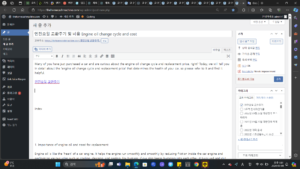Many of you have just purchased a car and are curious about the engine oil change cycle and replacement price, right? Today, we will tell you in detail about the ‘engine oil change cycle and replacement price’ that determines the health of your car, so please refer to it and find it helpful.

index
1. Importance of engine oil and need for replacement
Engine oil is like the ‘heart’ of a car engine. It helps the engine run smoothly and smoothly by reducing friction inside the car engine and performing various roles such as cooling, cleaning, and sealing. For humans, if our skin keeps bumping into each other, it turns red and dirt comes out, and oil is applied to relieve friction.
Neglecting oil changes can shorten engine life and, in serious cases, lead to engine failure. Therefore, regular oil changes are a necessity, not an option, for an engine that always looks new.
2. Know the engine oil change cycle
Today, automobile manufacturers are suggesting replacement cycles that take into account various engine types and usage conditions. For example, based on Hyundai Motor Company’s 2.0 gasoline engine, it is generally recommended to check the engine oil every 5,000 km (severe driving) to 8,000 km or every 6 months.
However, this is only a basic guideline, and the actual replacement cycle may vary depending on driving style, driving environment, type of oil, frequent idling or low-speed driving, frequent short distance driving, etc.
3. Engine oil type and replacement cycle
There are various types of engine oil, including mineral oil (regular oil) and synthetic oil. The difference between regular oil and synthetic oil can be likened to the difference between gasoline and premium gasoline.
Mineral oil, a general oil, is relatively inexpensive, but can easily oxidize at high temperatures and produce sludge. On the other hand, synthetic oil provides approximately two times higher performance than mineral oil and minimizes sludge generation.
If you use synthetic oil, the replacement cycle can be a little longer, but since it still creates the same residue and sludge, it can wear out similarly to mineral oil, so it is recommended to inspect it every 6 months or 5,000 km.
Experts are of the opinion that it is better to change regular oil frequently than to burn it for a long time using synthetic oil, which is 2 to 3 times more expensive than regular oil. However, for new cars, it is better to maintain them with low-wear synthetic oil from the beginning.
For your information, we highly recommend Magnetic Stop Start 5W-30 from Kestrol as a cost-effective engine oil.
4. Determine the correct engine oil change cycle
It is best to refer to the car manual and expert recommendations for the exact engine oil change cycle, but the most important thing is to accurately understand the condition and driving conditions of each vehicle. The engine oil change cycle must be determined by considering the driving environment (city driving, highway driving, off-road, etc.) and driving style (speeding, sudden acceleration/sudden stopping, etc.) that the vehicle mainly experiences.
5. Engine oil replacement cost
Engine oil change costs vary depending on labor costs, oil filter, and type of oil. For example, for a Hyundai Avante vehicle, labor costs are approximately 20,000 to 25,000 won, and oil filters are approximately 10,000 to 15,000 won. The price of oil varies depending on the quality of oil selected, but usually starts at 20,000 won for 4 liters.
Changing the engine oil takes approximately 15 to 20 minutes, and the engine oil, oil filter, and air cleaner must be replaced as one set. If you are visiting a repair shop for the first time, one of the best ways is to watch from the side while the engine oil is changed.
6. Engine oil change cycle
As of 2024, along with advances in engine technology, the quality of oil has also improved significantly. Newer vehicles may offer longer change intervals, and some high-performance vehicles may be able to extend the change intervals by using more expensive high-performance oil.
If you smell oil while driving, it may be a sign that you need to check the engine oil. Additionally, some people request to remove the remaining oil (approximately 200cc) in the name of oil performance, but this may not be cost-effective compared to the cost of the operation. Therefore, we recommend removing it using the free fall method described in the existing manual.
We have learned about engine oil change intervals and replacement prices above, and we hope this will be helpful in managing your vehicle.